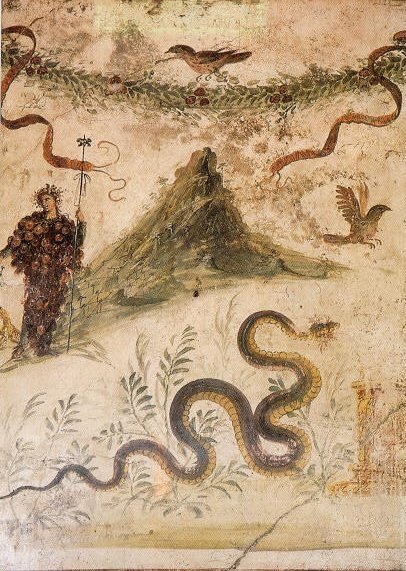August 24, 2007
Gratuitous Historickal Posting (TM)

Today is the anniversary of the famous eruption of Mt. Vesuvius in 79 A.D. that buried the nearby Roman resort town of Pompeii, together with Herculaneum, as well as heavily damaging Stabiae.
It also marks the death of Pliny the Elder, commander of the local naval fleet and student of natural history, who had himself rowed across the Bay of Naples in order to get a closer look at Vesuvius' eruption. His nephew Pliny the Younger recorded the old boy's demise:
Meanwhile on Mount Vesuvius broad sheets of fire and leaping flames blazed at several points, their bright glare emphasized by the darkness of night. My uncle tried to allay the fears of his companions by repeatedly declaring that these were nothing but bonfires left by the peasants in their terror, or else empty houses on fire in the districts they had abandoned. Then he went to rest and certainly slept, for as he was a stout man his breathing was rather loud and heavy and could be heard by people coming and going outside his door. By this time the courtyard giving access to his room was full of ashes mixed with pumice stones, so that its level had risen, and if he had stayed in the room any longer he would never have got out. He was wakened, came out and joined Pomponianus and the rest of the household who had sat up all night.They debated whether to stay indoors or take their chance in the open, for the buildings were now shaking with violent shocks, and seemed to be swaying to and fro as if they were torn from their foundations. Outside, on the other hand, there was the danger of failing pumice stones, even though these were light and porous; however, after comparing the risks they chose the latter. In my uncle's case one reason outweighed the other, but for the others it was a choice of fears. As a protection against falling objects they put pillows on their heads tied down with cloths.
Elsewhere there was daylight by this time, but they were still in darkness, blacker and denser than any ordinary night, which they relieved by lighting torches and various kinds of lamp. My uncle decided to go down to the shore and investigate on the spot the possibility of any escape by sea, but he found the waves still wild and dangerous. A sheet was spread on the ground for him to lie down, and he repeatedly asked for cold water to drink.
Then the flames and smell of sulphur which gave warning of the approaching fire drove the others to take flight and roused him to stand up. He stood leaning on two slaves and then suddenly collapsed, I imagine because the dense, fumes choked his breathing by blocking his windpipe which was constitutionally weak and narrow and often inflamed. When daylight returned on the 26th - two days after the last day he had been seen - his body was found intact and uninjured, still fully clothed and looking more like sleep than death.
Vesuvius is still very much an active volcano. And despite the fact that the Italians have created a national park immediately around it, suburban Naples continues to grow all about the area and now holds roughly 600,000 people in about 18 towns in the immediate vicinity. If and when the mountain blows again, well, it could get mighty ugly.


 Image courtesy of the lovely and talented
Image courtesy of the lovely and talented 